Scratch Starburst Original Design / Scratch Built
Scratch - Starburst {Scratch}
Contributed by Ray King
| Manufacturer: | Scratch |
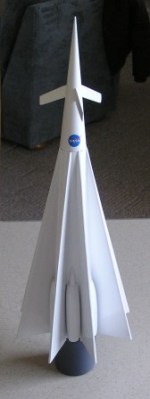
Brief:
This is my first entry for the EMRR “Spaceship Design Contest – 2009”. This year I planned to build 3
of the rockets choices, but only finished 2 of them. This is the first of them. Again this year my daughter named the
rocket and it comes from the view of the rocket from the top and the fact that is looks like a star burst – check
out the picture below.
Construction:
Component Description:
- 030” Thick Polystyrene Sheet
- 3 - 1/8”x3”x36” Balsa Sheets
- 8” – 5/16” Diameter Wood Dowel
- 8 - MMX tubes – 1.5” long
- 1 - BT80 - Main Tube - 3.0” long
- 1 – BT80 – Main Engine Tube – 14” long
- 1 - BT50 - Engine Tube - 14” long
- 1 - BT80 - Booster Tube – 3.0” long
- 1- BT 50 - Engine Tube – 3.0” long
- 1 - BT-50 Pointed Nose Cone
- 1 - 1/8” Launch lugs
- 4 - BT80 – BT50 Centering ring
- 36” - 175 # Kevlar® String
- 24” - .375” elastic shock cord
- Nose weight
- 24” plastic parachute
- Mylar Tape
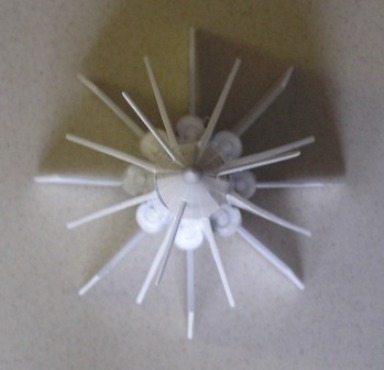
Plans
The first step was to layout the design on RocSim. I chose a 24mm motor engine because I want to make this a staged rocket I was going to need plenty of power to overcome the nose weight required. In addition to the 24mm engine; I added 8 MMX engines to better represent the pictures provided.
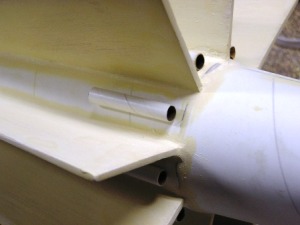
Main Body Tube Assembly
I started by cut the BT80 tube lengthwise and laid out the template made from the EMRR shroud calculator. I cut this template from paper wrapped it around the tube and cut the tube to match the template (see picture). I curled the tube around the nose cone and centering ring and glued it in place using the blue masking tape to hold it while the glue dried (see picture). Once the outside tube was dry I removed the centering rings and nose cone and inserted a BT50 and glue it in place. I used the centering ring in the large end to ensure the tube was centered on the outside tube. Next I glued the large centering ring in the large end of the outer tube.
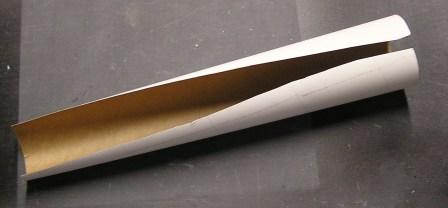
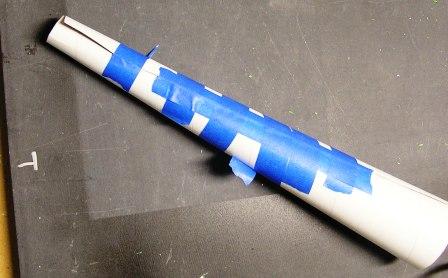
Finally, I filled all the tube spirals and seam with Elmer’s wood putty watered down to a paste consistency.

Fins are next. RockSim file contains the template for these, I cut them out of 1/8” balsa. I used the Standard Rocket Fin Fixture to hold each of the fins in place one at a time. I was fortunate enough to acquire one these at NARAM-51 and I love it (see the pictures). There is also a picture with all the fins attached.
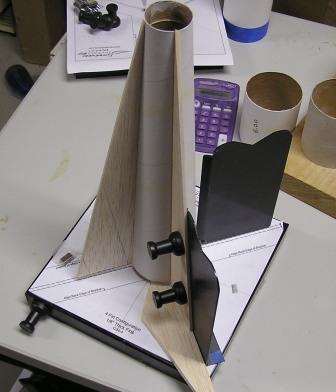
I repeated the same procedure for the motor end tube changing the overall diameter from 2.60” to 2.35”. I sanded down 1 of the centering rings to fit in the small end of the tube. Once it fit nicely I glued it in place and epoxied this assembly to the main body. Finally, I filled all the tube spirals and seam with Elmer’s wood putty watered down.
External Engine Cell
The external engine cells are made up of 4 separate pieces:
- Vacuum formed body
- MMX Tube (motor holder)
- ¼” dowel tube plug
- 5/16” dowel front cone
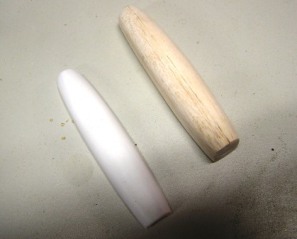 The body was constructed using to polystyrene sheets, vacuum formed into the appropriate shape. I have
included pictures of the balsa master used to make the final shape. Each of the vacuum formed shapes were trimmed after
forming and test fit. I left a little extra material that was sanded for final fit. The better they fit at this point
the less work you will be doing during the finishing process. I used thick CA to tack the halves in place and then 5
minute epoxy around the outside of the joint. Be careful not build up too much epoxy otherwise, you will be sanding it
off later.
The body was constructed using to polystyrene sheets, vacuum formed into the appropriate shape. I have
included pictures of the balsa master used to make the final shape. Each of the vacuum formed shapes were trimmed after
forming and test fit. I left a little extra material that was sanded for final fit. The better they fit at this point
the less work you will be doing during the finishing process. I used thick CA to tack the halves in place and then 5
minute epoxy around the outside of the joint. Be careful not build up too much epoxy otherwise, you will be sanding it
off later.
Next, I took the 3/16” dowel and sharpen it in my wife’s electric pencil sharpen, which I know now what I can get her for Christmas – a new pencil sharpener. Once I had these sharp, I filled them with watered down Elmer’s wood putty, sanded smooth. Finally, I sanded each in half and to fit them to the main body.
I cut the MMX tube into 8 - 1.5” lengths. I then cut the ¼” dowel into ¼” lengths and glued them into the one end of the MMX tube.
Final Assembly
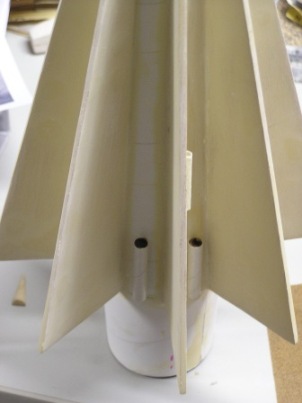 I
first marked the centerline between each of the fins on the main body assembly and then glued the MMX tube on the line
and located vertically near the base of the fin. Next, I sanded each vacuum formed piece to fit over the MMX tubes and
on the main body tube. I epoxied each in place cleaning up any excess around the outside of the joint. The last step
was adding the pointed dowels – I sanded them to fit nicely to the vacuum formed piece and body tube. Then glued
them in place.
I
first marked the centerline between each of the fins on the main body assembly and then glued the MMX tube on the line
and located vertically near the base of the fin. Next, I sanded each vacuum formed piece to fit over the MMX tubes and
on the main body tube. I epoxied each in place cleaning up any excess around the outside of the joint. The last step
was adding the pointed dowels – I sanded them to fit nicely to the vacuum formed piece and body tube. Then glued
them in place.
Nose Weight
RocSim showed I needed to add at least and 1.0 oz of nose weight to make the rocket stable. I ended up adding about 2.0 oz which took the overall rocket up to the max lift off weight for a D engine.
Booster Tube Assembly
For the booster I cut a BT50 tube 3.0” long then epoxied the centering ring .375” from the end of the tube. Next, I glued the BT80 tube to the centering ring sub-assembly and let dry. Time for fins – I cut the fins per the template in the RockSim file, coated each with watered down Elmer’s wood putty, sanded them and repeat this until they we smooth. Next I glued in place just I did the main body using the Standard Rocket Fin Fixture. I used the upper stage to ensure the fins lined up when the two pieces were assembled together.
Paint and Finishing
I painted the main body tube assembly, and boost assembly separately.
Main Body Tube Assembly
I sprayed 2 or 3 coats on the entire shell assembly with Rust-oleum White Plastic Primer #209460. After lightly sanding the primer, I sprayed white gloss (Rust-oleum 7792 Gloss White). Next, I masked the engine area and sprayed engine grey (Testors Acryl #4749). After the grey, I added NASA decals. Finally, I added 2-3 coats of Krylon Crystal Clear Gloss.
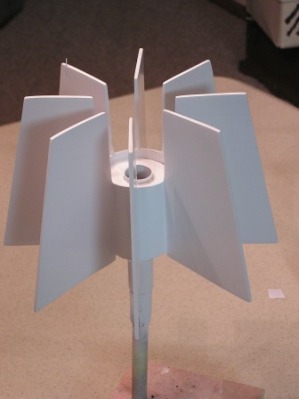
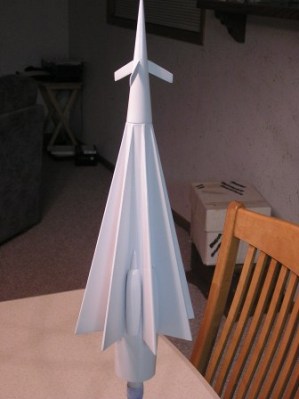
Booster Tube Assembly
I repeated the same process for the booster; I sprayed 2 or 3 coats on the entire shell assembly with Rust-oleum White Plastic Primer #209460. After lightly sanding the primer, I sprayed white gloss Rust-oleum 7792 Gloss White). Next, I masked the engine area and sprayed engine grey (Testors Acryl #4749).
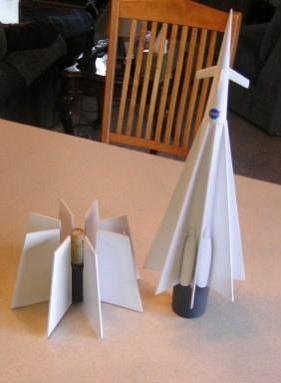
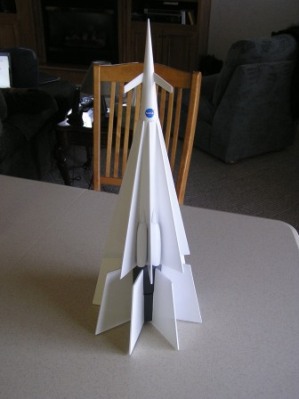
Decals
I printed the decals on Experts-Choice clear water slide decal material. I cut them out and applied them as the pictures shows.
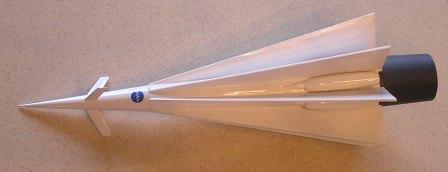
Flight Plan
My plan for this rocket was to launch the first attempt with only 1 stage D12-3 and then launch the rocket with the first and second stage and finally launch the first stage with the 8 – MMX engines on the sides of the rocket.
Flight Prep & Flight Results
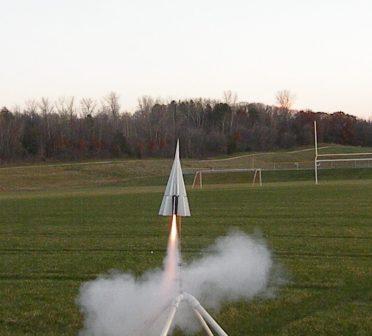
As I mention first flight was with a D12-3. I loaded the engine, added dog barf, powdered a 24 inch plastic chute, installed nose cone, a slid the rocket on to the launch rod.
The wind was clam, perfect evening. The flight was a little crazy, although it left the rod nice and straight at about 100 feet the rocket turn horizontal and flew about 500-600 feet until the ejection. Parachute opened, but the rocket hit the ground pretty hard. After inspecting the rocket, I could not believe it; even the nose fins were still attached.
I added some additional nose weight and with the sun setting I was getting nervous so I decide to go for the 2 stage launch.
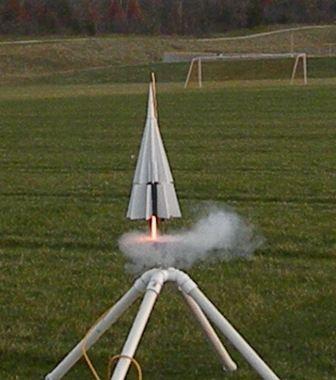 I
prepped the booster stage with D12-0 and the main body with D12-5. After adding the dog barf, parachute it was time to
see if this thing would fly with 2 stages.
I
prepped the booster stage with D12-0 and the main body with D12-5. After adding the dog barf, parachute it was time to
see if this thing would fly with 2 stages.
On the pad the rocket looked awesome 5-4-3-2-1 ---- blaster off. The boost engine lit and lifted the rocket to
about 300 feet and the then the sustainer engine lit, weather cocking the rocket at about 700 feet and about that far
away the ejection charge blew and ejected the parachute. The rocket tumble quite bit until the parachute opened. Upon
recovery I found the Kevlar®
shock cord zippered the tube off 4 inches – BUMMER!!!! No time to fix this for submission, but it will be repaired
and will fly again this rocket has great potential and I can not wait to flight it with the 8 MMX engines firing on the
slide mounted engine cells.
Summary:
Pro’s – Has great potential and a pretty cool look.
Con’s – WOW lots of balsa to sand and fill.
Other:
Thanks EMRR - this was a great project. This was only my 3rd rocket I designed completely on RockSim. I enjoyed the
design and construction challenges. I think I will always spin test any unique rockets for stability prior to launch
from now on. I am looking forward to 2010’s spaceship challenge.
 |
 |